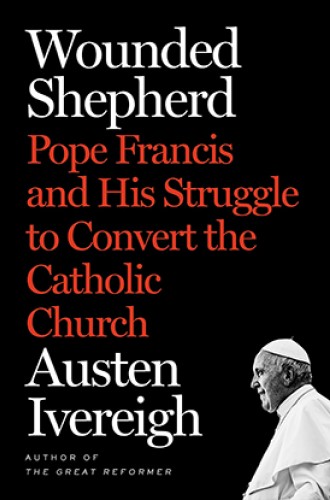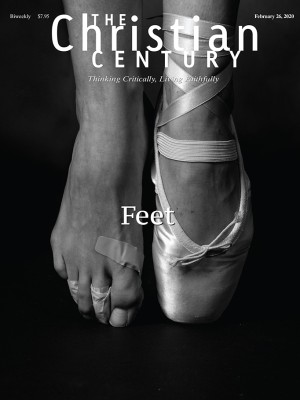Pope Francis’s vision of a wounded church converted by mercy
How can the church become less of a citadel and more of a field hospital?
Shortly after Pope Francis was elected, I noticed a woman at my church wearing a T-shirt that read “I ‘Heart’ Pope Francis.” I was surprised to see a member of my very Protestant congregation sporting Catholic fan gear. She told me she was happy about Francis because he was a progressive who she hoped would lead to a more open future. She was not alone. A lot of Protestants cheered the election of Pope Francis.
The perception of Francis as a progressive rests on the assumption that ideas and movements can be identified as either liberal or conservative. When this interpretive scheme is applied to Catholic history, Vatican II often gets portrayed as a liberal turning point. John Paul II and Benedict XVI are typed as conservatives who shut the theological window opened by John XXIII, and Francis is portrayed as a liberal struggling to reopen it and allow fresh winds back into the church. There is a grain of truth to this narrative, but it fails to display the complexity of the Second Vatican Council, which was as much about retrieving the tradition (ressourcement) as it was about updating doctrine (aggiornamento).
Read our latest issue or browse back issues.
Austen Ivereigh contended in his earlier biography, The Great Reformer, that Pope Francis is neither liberal nor conservative. He is radical, seeking to reform the Catholic Church in ways that confound liberals and conservatives alike. Francis is not one to shy away from confronting presumably settled issues, nor does he refrain from challenging the religious culture that stands in the way of being more faithful to the gospel.
While The Great Reformer told the story of Jorge Bergoglio from childhood to election as pope, Wounded Shepherd picks up the story with his papacy and brings it up to date. As Ivereigh was writing the second volume, Francis invited him to Rome for a personal audience. In that June 2018 encounter, the pope thanked Ivereigh for his book but he said it was “too kind.” This troubled the author. He realized he was being warned against contributing to a myth about Francis. In Wounded Shepherd, Ivereigh seeks to present an authentic portrait of Pope Francis—less kind, perhaps, but more truthful.
Key to pastoral leadership, for Francis, is listening to the people. “If you do not touch the faith of the people,” he told the bishops of Peru in 2017, “the faith of the people does not touch you.” This populist theme which has permeated his papacy, Ivereigh notes, has its roots in Argentina, where the young Bergoglio learned from President Juan Perón that effective leaders are like the conductor of an orchestra, who leads by inspiring and encouraging, never by ordering.
Yet the deepest influences on Francis’s concept of leadership came from what would become known as teología del pueblo, which embraced the preferential option for the poor (although in a way that attended more closely to popular piety than did other forms of liberation theology).
The church that Francis was chosen to lead is wounded in several ways, from the Vatican bank scandal to the clergy sexual abuse crisis. Everyone expected Francis to bring reform. Ivereigh himself even promoted that expectation. This new book portrays Francis not as a radical reformer, but as a wounded shepherd leading a wounded church.
Ivereigh reveals a pope who understands that genuine reform is in God’s hands, not his. “I just want to put Christ ever more at the center of the Church.” Francis recognized that what the church needs is more than changes in procedure. It demands the transformation of the entire curial and ecclesial culture. To put it more simply, the Catholic Church must be converted.
Only by putting Christ at the center can banking be turned into mission that serves the poor. Only by putting Christ at the center can the wounds of sexual abuse survivors be healed and the clericalist culture—which allows priests to abuse and bishops to cover up abuses—be overturned. Only a wounded and converted church with Christ at the center can understand that it does not have a mission, but rather it is God’s mission.
The church must be converted by God’s mercy, Francis believes, so that it can be more field hospital than citadel. That means speaking out not only on issues at the beginning and end of life, but also advocating for midlife challenges like unemployment, immigration, and ecology.
In Ivereigh’s account, Francis is leading the Catholic Church toward conversion. But conversion is not an instantaneous event. It is a dynamic process of welcoming, discerning, accompanying, and integrating.
A wounded church converted by mercy will seek ways toward fuller participation of divorced and remarried people in its life together, and it will welcome gay people into the pastoral care of a community that is conscious both of its own woundedness and of God’s mercy. Legal principles and moral rules cannot create these new paths. That new direction lies in following the way of mercy. Yet mercy is messy. Wounded Shepherd tells that messy story with clarity and honesty.







